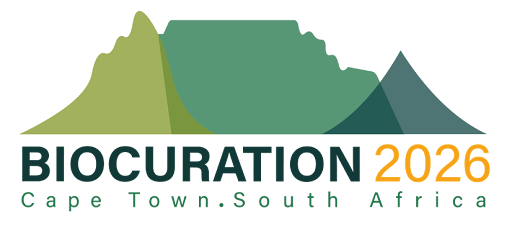19th Annual International Biocuration Conference
Primary tabs
19th Annual International Biocuration Conference
20 to 24 April 2026 in Cape Town, South Africa

Registration for the 19th Annual International Biocuration Conference is currently open. Registration fees are subject to ISB Membership.
For more information on ISB membership, visit: https://www.biocuration.org/membership/join-isb
Register Here / Submit Abstract
Registration fees are summarised below. Travel fellowships are available to attendees submitting an abstract for an oral or poster presentation, and subject to review.
| Registration Type (Membership Status) | Early Bird | Standard |
|---|---|---|
| Academic (ISB member) | ZAR 4400 (250 USD) | ZAR 5300 (300 USD) |
| Academic (Non-member) | ZAR 5300 (300 USD) | ZAR 6200 (350 USD) |
| Non-academic (ISB member) | ZAR 5800 (330 USD) | ZAR 6700 (380 USD) |
| Non-academic (Non-member) | ZAR 7900 (440 USD) | ZAR 9300 (520 USD) |
| Retiree/LMIC/Student (ISB member) | ZAR 1500 (85 USD) | ZAR 3200 (180 USD) |
| Retiree/LMIC/Student (Non-member) | ZAR 2700 (150 USD) | ZAR 3200 (180 USD) |
| Virtual (ISB member) | ZAR 1500 (85 USD) | ZAR 2700 (150 USD) |
| Virtual (Non-member) | ZAR 2700 (150 USD) | ZAR 4400 (250 USD) |
Early Bird Registration Closes: January 30, 2026
Registration Closes: March 27, 2026 (or when attendee cap is met)
Abstract Submission
This is an invitation to students, scientists and professionals working and interested in the field of biocuration to submit high quality abstract for oral or poster presentation at 19th Annual International Biocuration Conference, in April 2026.
Oral Abstract Submission Deadline: November 28, 2025
Notification of Decision: December 15, 2025
Abstract talks and posters will be organized according to scientific topics, which are covered by the conference (see below).
Scientific Themes:
| Theme | Description |
|---|---|
| Capacity Building, Training, and Infrastructure Development | Abstracts are invited on successful capacity-building initiatives, fellowship programs, centralized training material repositories, open-access tools, and strategies for long-term infrastructural development. Submissions highlighting partnerships, community-driven approaches, and lessons learned from case studies are encouraged. |
| Career Landscape in Biocuration – Challenges and Opportunities | This theme invites abstracts that explore the current and future career landscape for biocurators, including skills development, mentorship programs, recognition and professional advancement, and strategies to attract and retain talent. Submissions that address structural challenges, highlight success stories, and propose solutions for building sustainable and rewarding careers in biocuration are particularly encouraged. |
| Databases, Knowledgebases, and Knowledge Graphs | This theme welcomes abstracts describing database design, scalable architectures, curated knowledgebases, and knowledge graphs that facilitate data linkage and discovery. Submissions may cover semantic web technologies, visualization tools, integration approaches across disciplines, centralized access to training resources and tool repositories, and examples of community-driven development for real-world applications. |
| Data Standards and Ontologies | This theme invites abstracts addressing the development, refinement, and adoption of controlled vocabularies, frameworks for improving data quality, and methods for semantic harmonization across diverse datasets. Contributions may include strategies for enhancing discoverability and integration, community-driven standards development, approaches to detect AI-generated data, and practical solutions for cleaning and validating large-scale biological datasets. |
| Environmental, Biodiversity, and Cross-Domain Curation | This theme seeks abstracts on innovative approaches to curate ecological data, track species and habitat changes, and integrate environmental datasets with health and climate models. Contributions prioritizing underrepresented domains, such as biodiversity and non-health datasets, and highlighting case studies from Africa and other emerging regions are particularly welcome. |
| Ethics, Data Governance, and FAIR & Inclusive Stewardship | Abstracts are invited on topics such as FAIR and inclusive data stewardship, indigenous data sovereignty, consent and benefit-sharing policies, and governance frameworks that support transparency and global collaboration. Contributions highlighting novel approaches to data ethics, inclusive practices, and governance solutions for emerging AI applications in curation are particularly encouraged. |
| Future of Biocuration and Expansion of Communities of Practice | This theme focuses on envisioning the future of biocuration, including emerging trends, novel areas of application, and cross-domain collaborations. We invite abstracts that discuss building and strengthening communities of practice, fostering global collaboration, and exploring innovative approaches to make biocuration more inclusive, interdisciplinary, and impactful over the next decade. |
| Global Diversity in Biocuration | This theme welcomes abstracts exploring culturally responsive curation practices, strategies to overcome structural barriers to participation, and efforts to connect curators globally. Contributions may also highlight case studies and initiatives that foster inclusive and diverse data contributions across regions and knowledge systems. |
| Methods, Tools, and AI for Biocuration | This theme focuses on innovative methodologies, workflows, and technologies that advance biocuration. We welcome submissions on automation strategies, reproducible curation techniques, scalable pipelines for complex datasets, and the responsible use of artificial intelligence and machine learning. |
Travel fellowships
Travel fellowships are available, and subject to review. Applications for general travel fellowships close 14 Nov 2025, and require completion of the registration form. Applications for ISB-specific travel fellowships, require completion of the registration form and completion of an additional application form, these applications close Oct 31st 2025. Fellowships are limited, and early career researchers will be prioritised for these awards. Travel fellowships cover accommodation, airfare, and conference registration.